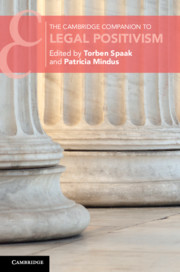Book contents
- The Cambridge Companion to Legal Positivism
- Cambridge Companions to Law
- The Cambridge Companion to Legal Positivism
- Copyright page
- Contents
- Figures
- Contributors
- Acknowledgements
- 1 Introduction
- Part I Fundamentals
- Part II History
- Part III Central Figures
- Part IV Main Tenets
- 17 Social-Practice Legal Positivism and the Normativity Thesis
- 18 Social Facts and Legal Facts: Perils of Hume’s Guillotine
- 19 The Scope of Legal Positivism: Validity or Interpretation?
- 20 What Is Law and What Counts as Law? The Separation Thesis in Context
- 21 The Origins of Inclusive Legal Positivism
- 22 Disruptive Implications of Legal Positivism’s Social Efficacy Thesis
- 23 The Semantic Thesis in Legal Positivism
- Part V Normativity and Values
- Part VI Critique
- Index
- References
23 - The Semantic Thesis in Legal Positivism
from Part IV - Main Tenets
Published online by Cambridge University Press: 21 January 2021
- The Cambridge Companion to Legal Positivism
- Cambridge Companions to Law
- The Cambridge Companion to Legal Positivism
- Copyright page
- Contents
- Figures
- Contributors
- Acknowledgements
- 1 Introduction
- Part I Fundamentals
- Part II History
- Part III Central Figures
- Part IV Main Tenets
- 17 Social-Practice Legal Positivism and the Normativity Thesis
- 18 Social Facts and Legal Facts: Perils of Hume’s Guillotine
- 19 The Scope of Legal Positivism: Validity or Interpretation?
- 20 What Is Law and What Counts as Law? The Separation Thesis in Context
- 21 The Origins of Inclusive Legal Positivism
- 22 Disruptive Implications of Legal Positivism’s Social Efficacy Thesis
- 23 The Semantic Thesis in Legal Positivism
- Part V Normativity and Values
- Part VI Critique
- Index
- References
Summary
Green considers a strong version of the semantic thesis, according to which legal statements are descriptive statements solely about social facts. He starts from the foundational thesis of positivism, the social thesis, which has it that the existence and content of the law are ultimately based solely in social facts about a community. But he notes that there are two versions of this thesis. Under the reduction version, a legal system and its laws consist of social facts. Under the assignment version, they are not social entities at all; they are norms, understood as abstract objects. But the grounds for assigning these abstract objects to a community are ultimately solely social facts. Focusing on the assignment version, he asks whether the semantic thesis follows from the social thesis, and, if that answer is no, the extent to which legal statements actually conform to the semantic thesis. He argues that assignment positivists can conclude that the answer is negative because, for them, legal statements describe abstract objects. For Green, this simple account of the semantics of legal statements is superior to expressivist accounts and to Raz’s account.
- Type
- Chapter
- Information
- The Cambridge Companion to Legal Positivism , pp. 536 - 558Publisher: Cambridge University PressPrint publication year: 2021
References
- 1
- Cited by

